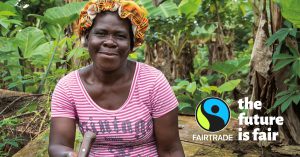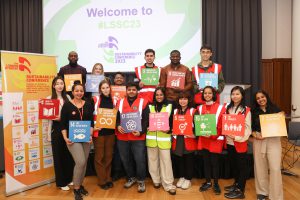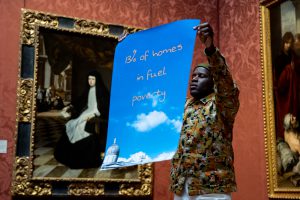This blog post was written by Wendy Whittall, studying the Climate Change – Environment, Science & Policy MSc at King’s.
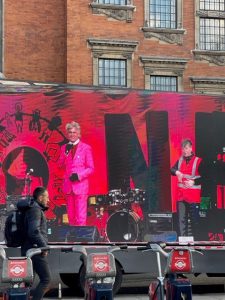 I was watching the Reverend Billy and the Stop Shopping Choir on the main stage. The Choir had not made the stage, maybe not even the UK, so we (a melange of protesters, environmentalists, protectors and activists at The Big One) watched hypnotised by the Revered Billy with his Elvis-style white shock of hair, dog collar and shiny, bright pink suit who had arrived from NY to give us an impassioned talk about the Earth which was interspersed with him singing enthusiastically…. Earth-a-lujah, Earth-a-lujah.
I was watching the Reverend Billy and the Stop Shopping Choir on the main stage. The Choir had not made the stage, maybe not even the UK, so we (a melange of protesters, environmentalists, protectors and activists at The Big One) watched hypnotised by the Revered Billy with his Elvis-style white shock of hair, dog collar and shiny, bright pink suit who had arrived from NY to give us an impassioned talk about the Earth which was interspersed with him singing enthusiastically…. Earth-a-lujah, Earth-a-lujah.
Earlier in the day, it was trying to rain when I had met up at the COVID memorial wall, the heart-covered wall on the Westminster side of the bridge, with members of th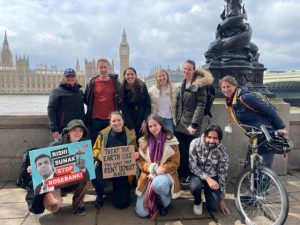 e King’s Climate Action Network and South London Citizens to carry out a Listening Project on the first day, Friday 21st April, of The Big One, the four-day marathon XR event which had attracted over 200 organisations. The event was a change of tactics to be family-friendly, educational and fun with the hope of creating momentum to end all new government fossil-fuel licences.
e King’s Climate Action Network and South London Citizens to carry out a Listening Project on the first day, Friday 21st April, of The Big One, the four-day marathon XR event which had attracted over 200 organisations. The event was a change of tactics to be family-friendly, educational and fun with the hope of creating momentum to end all new government fossil-fuel licences.
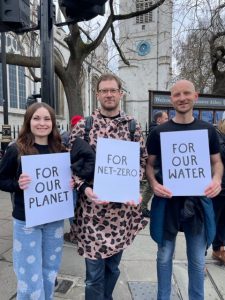
I joined up with Paulina and Jone to chat with several people to find out their reasons for coming to The Big One. Our first conversation was with a worker who, with her large board, had taken the day off to protest against the government’s inability to push through the Buildings Bill which, if passed, would reduce dramatically the 50mt of carbon emission by the UK construction industry.
We then spoke to two lovely well-dressed ladies, one had graffitied the back of her expensive coat and re-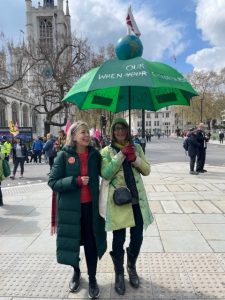 engineered a green umbrella for the occasion, who had never been to an XR event beforehand and were motivated to attend as they understood it would be peaceful. They had arrived to support XR’s initiative to keep a future for their grandchildren. We also spoke to a couple of new sustainable businesses and long-time activists from Brighton.
engineered a green umbrella for the occasion, who had never been to an XR event beforehand and were motivated to attend as they understood it would be peaceful. They had arrived to support XR’s initiative to keep a future for their grandchildren. We also spoke to a couple of new sustainable businesses and long-time activists from Brighton.
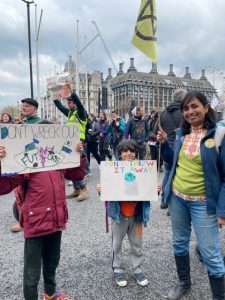 Whilst we were watching the XR parade which included lots of drummers and spooky-looking people dressed head-to-toe in lipstick red floaty dresses, we met a young family from London whose boys had made their own banners, one stating “Don’t Wreck our Future” and the other “Don’t Throw it Away”.
Whilst we were watching the XR parade which included lots of drummers and spooky-looking people dressed head-to-toe in lipstick red floaty dresses, we met a young family from London whose boys had made their own banners, one stating “Don’t Wreck our Future” and the other “Don’t Throw it Away”.
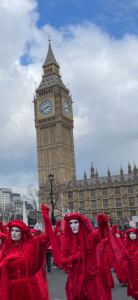 After we had all gathered for a debrief of the project and left to go our separate ways, I continued down the length of Milbank dotted with many pop-up marquees à la festival including activists from Climate Justice, Greenpeace and Doctors and Psychologists were represented plus different forms of art activities. I was interested in talking to the Climate Fresk promoters, a collaborative workshop teaching the science of climate change based on the IPCC reports motivating a wider understanding of the problem.
After we had all gathered for a debrief of the project and left to go our separate ways, I continued down the length of Milbank dotted with many pop-up marquees à la festival including activists from Climate Justice, Greenpeace and Doctors and Psychologists were represented plus different forms of art activities. I was interested in talking to the Climate Fresk promoters, a collaborative workshop teaching the science of climate change based on the IPCC reports motivating a wider understanding of the problem.
To my delight I met, at the Climate Fresk stand, some environmentalists who had arrived from several different countries in Europe, Sweden, Germany & Belgium to name a few, to attend all four days. I 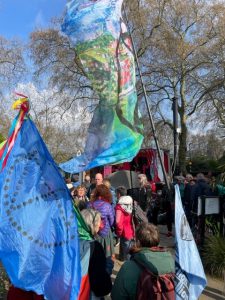 spoke to a doctor from Germany who had arrived by coach with 50 other passionate environmentalists. He had in the past organised climate-related events and was at The Big One to understand the positives and negatives of the event to create a similar event in Germany. His motivation was the experience of heat exposure during the summer months, and how the media does not talk about the number of deaths in the elderly, the young and the vulnerable, over 8,000 in 2022. He said that Germany had already passed the 1.5C IPCC bar and that the summers are longer and hotter. He also spoke about adequate wind farm energy for the entire country but due to an archaic law, whereby, if there is surplus energy being produced the energy is reduced by ‘switching off’ the newest (renewable) energy, thereby leaving coal as the burning, polluting energy source. He also acknowledged that the Greens, in the coalition German government, had sold out politically.
spoke to a doctor from Germany who had arrived by coach with 50 other passionate environmentalists. He had in the past organised climate-related events and was at The Big One to understand the positives and negatives of the event to create a similar event in Germany. His motivation was the experience of heat exposure during the summer months, and how the media does not talk about the number of deaths in the elderly, the young and the vulnerable, over 8,000 in 2022. He said that Germany had already passed the 1.5C IPCC bar and that the summers are longer and hotter. He also spoke about adequate wind farm energy for the entire country but due to an archaic law, whereby, if there is surplus energy being produced the energy is reduced by ‘switching off’ the newest (renewable) energy, thereby leaving coal as the burning, polluting energy source. He also acknowledged that the Greens, in the coalition German government, had sold out politically.
And it was about then when the Reverend Billy entered on stage. It had stopped raining, the sun was out, and there was the heavy scent of patchouli and the faint whiff of weed in the air. After the final and rousing Earth-a-lujah, Earth-a-lujah, I wended my way back down Milbank to Westminster tube.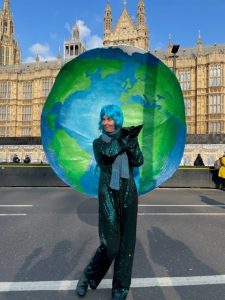
I hadn’t gone far when I met up with the Mothers’ Climate Action Network with one of the mums dressed in an eye-catching French blue sequinned trouser-suit together with a turquoise bobbed wig all framed by a massive globe that she wore like a giant circular wing.
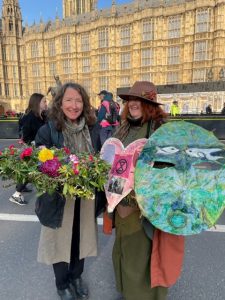 Just a bit further on I met two lovely ladies carrying a gorgeous-smelling wreath made that morning in one of their workshops. Each flower and stick of herb that had been added to the wreath had a prayer attached and the following day, Earth Day, they were going to hold a service by the Thames and return the wreath to the Earth by floating it on the Thames and releasing all the prayers to the world.
Just a bit further on I met two lovely ladies carrying a gorgeous-smelling wreath made that morning in one of their workshops. Each flower and stick of herb that had been added to the wreath had a prayer attached and the following day, Earth Day, they were going to hold a service by the Thames and return the wreath to the Earth by floating it on the Thames and releasing all the prayers to the world.
Over the weekend, I attended a couple (6 hours worth) of Climate Fresk workshops in Canada Water where I met Ruth, who had been an XR Steward. I offered to return her aprons to The Big One on Sunday, and while doing so, I was persuaded to stay for a 10-minute Climate Justice comedy session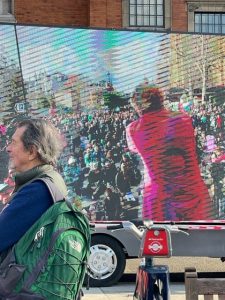 by Kate Smurthwaite (www.linktr.ee/katesmurthwaite). Big shout out.
by Kate Smurthwaite (www.linktr.ee/katesmurthwaite). Big shout out.
The Big One was an interesting and wonderful event that brought people together, those that have voiced on our behalf for years and those who would not have normally attended an event, speaking for our future. There were the loud and passionate Earth-a-lujahs to the quiet and spiritual wreath laying of our prayers. All of us whether loud, angry, hopeful, funny, spiritual or sad were all there for the same aim. It was a mess of emotions in a world of business as usual on a warming planet.
This listening exercise was carried out as part of a climate listening campaign being carried out by King’s Climate Action Network in collaboration with South London Citizens. The campaign brings together community members through a community organising approach and invites them to talk about issues related to climate change they care about and reflect on why they are important to them. By listening to and connecting with people, the campaign aims to build our collective power and create a local climate movement that puts our communities’ concerns first.











